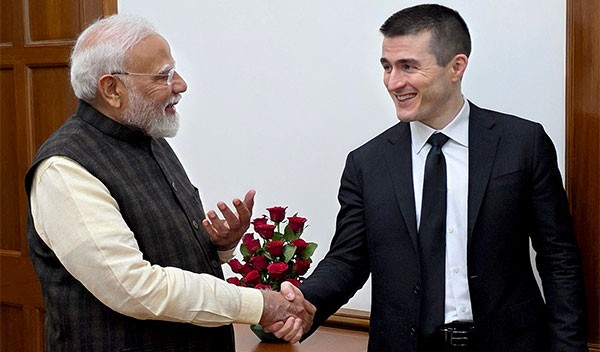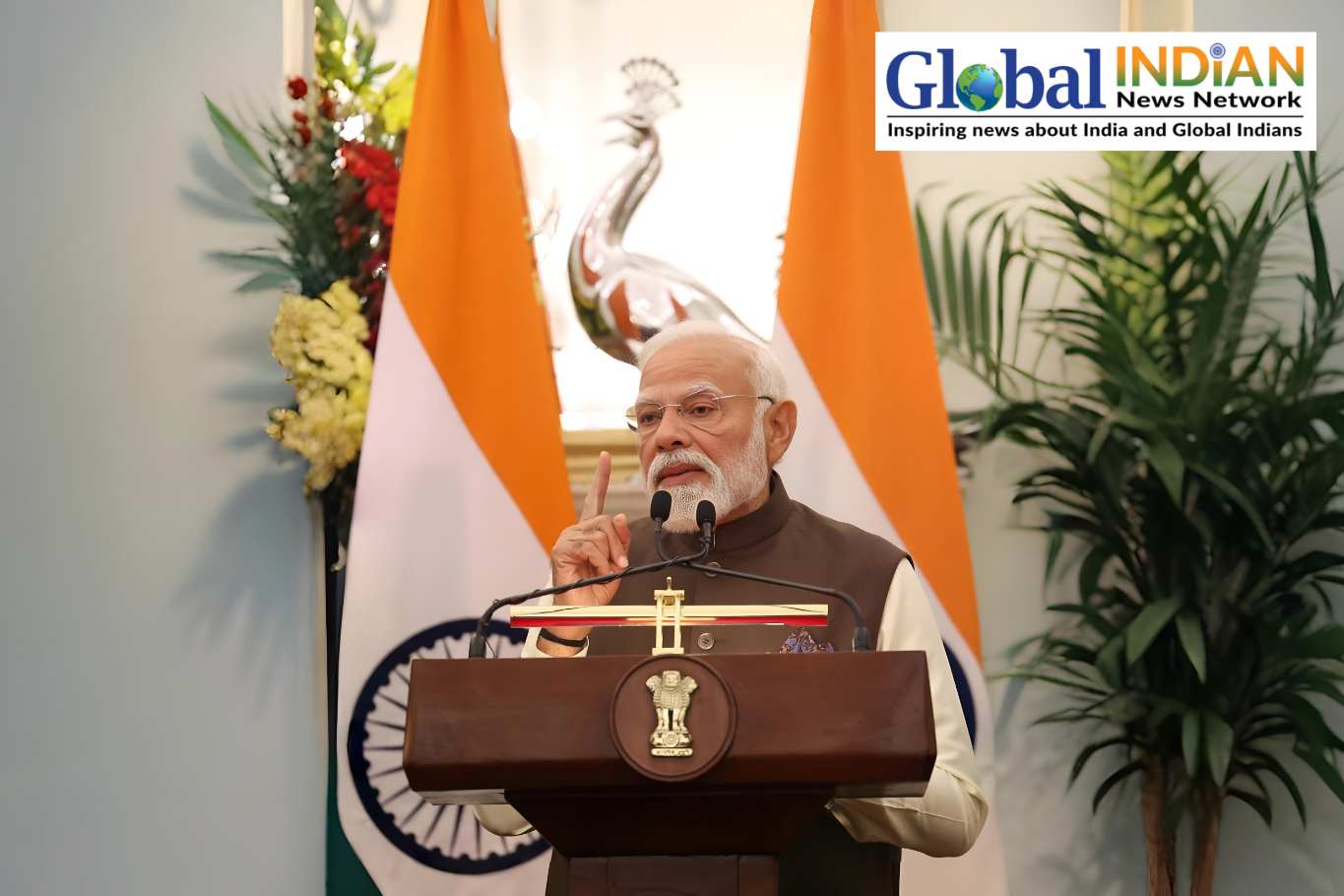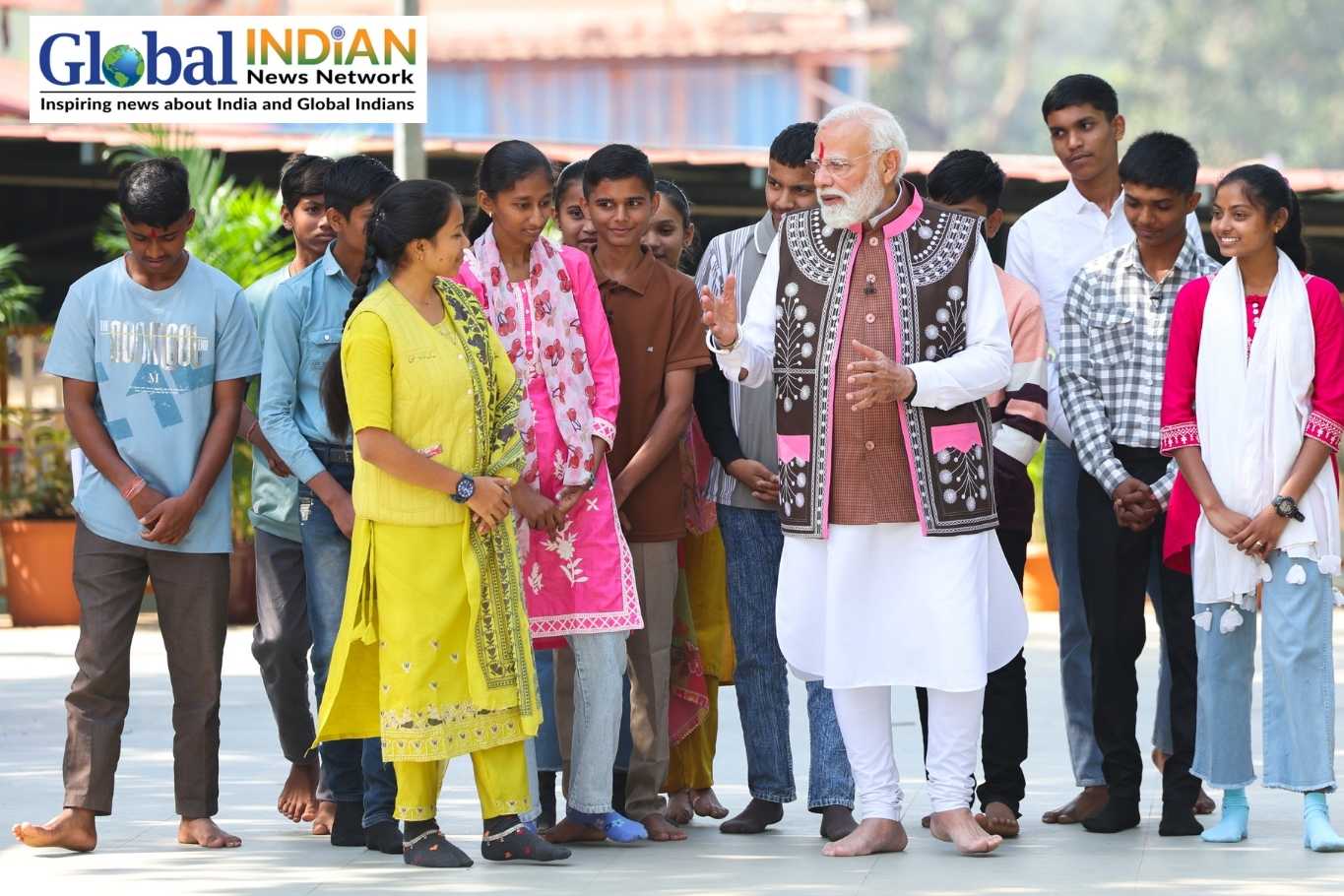A Brief Summary of Lex Fridman Podcast with Narendra Modi By Raj Shah

Photo Courtsey: X.com
On March 16, 2025 Lex Fridman, a Russian-American computer scientist, professor, AI researcher based at MIT and podcast host interviewed Indian Prime Minister Narendra Modi.
Here is a Brief Summary of Lex Fridman Podcast with Narendra Modi.
Lex Fridman introduces his conversation with Indian Prime Minister Narendra Modi as one of the most profound discussions of his life. Mr. Fridman acknowledges Modi’s incredible journey from poverty to leading India, the world’s largest democracy, and highlights his global impact as a leader and peacemaker.
The in-depth interview with Indian Prime Minister Narendra Modi covered a wide range of topics, from India’s economic reforms to global diplomacy, personal leadership philosophy, and the role of technology in shaping the future. Throughout the discussion, Modi shared personal anecdotes, historical perspectives, and his vision for India’s progress. He emphasized the values of public service, dedication to the nation, and his deeply ingrained philosophy of leadership.
Modi, in his opening remarks, emphasizes that his strength does not lie in his individual identity, but in the backing of 1.4 billion Indians and India’s thousands of years of cultural heritage. He presents himself as a representative of India’s values, citing Mahatma Gandhi, Swami Vivekananda, and India’s ancient Vedic traditions. He also underscores India’s historical role as a land of peace, referencing Gautama Buddha and Mahatma Gandhi’s legacies.
Modi’s Humble Beginnings
Modi described his childhood in Vadnagar, Gujarat, growing up in a small house without electricity or shoes. His father was a tea vendor, and young Modi helped him while pursuing his education. Despite economic hardships, he never felt poor because he did not compare his life to luxury. His mother instilled values of cleanliness, self-reliance, and service—qualities that continue to shape his leadership today.
Spiritual Journey in the Himalayas
At age 17, Modi left home to explore the Himalayas, living a nomadic life among monks and spiritual seekers. He read extensively about Swami Vivekananda, which deepened his desire to seek higher truths. He recounts his experiments with physical endurance, such as sleeping without blankets in the cold, to test his body’s limits.
During his journey, he met Swami Atmasthanandji of the Ramakrishna Mission, who steered him toward a life of service rather than renunciation. Modi explains that, though he could have chosen the path of a monk, his spiritual foundation remains at the core of his leadership.
Early Life, Political Journey, and Governance Philosophy
Modi began by sharing his early experiences in politics, emphasizing his deep-rooted connection with the people of India. Before assuming public office, he extensively traveled across India, spending nights in nearly 90% of the country’s districts to understand the needs of ordinary citizens. His leadership is built on firsthand knowledge of India’s grassroots realities.
When he assumed the role of Chief Minister of Gujarat in 2001, the state had just experienced a devastating earthquake. His immediate priority was rehabilitation and reconstruction, ensuring that those affected received government support efficiently. He stressed that governance, in his view, is about action rather than rhetoric. His approach to leadership is one of service, and he sees himself not as a ruler but as a “prime servant” of India. His guiding principle is “Nation First,” ensuring that every policy decision prioritizes the interests of the people of India.
Fasting, Discipline, and a Life of Service
Lex Fridman, noting that he was fasting before the interview, inquires about Modi’s long-standing practice of fasting. Modi explains that fasting in India is not just about abstaining from food, but a spiritual and scientific process that sharpens the mind, senses, and discipline. He shares that he fasts for nine days during Navratri, drinking only hot water. Additionally, during the monsoon season (Chaturmas), he follows a four-month-long one-meal-a-day discipline.
Modi describes how fasting enhances his thinking, keeps him energetic, and aligns his body and mind. He recounts a moment when he attended a White House dinner while fasting and humorously told President Obama that his “dinner has arrived” while pointing to a glass of hot water. Modi views fasting as a tool for self-discipline and service.
Joining the RSS and Hindu Nationalism
Fridman asks about Modi’s involvement with the Rashtriya Swayamsevak Sangh (RSS), which he joined at age 8. Modi describes the RSS as an organization focused on discipline, service, and nation-building. He highlights its contributions to education and social work, citing projects like 125,000 social service initiatives, 70,000 tribal schools, and large labor unions.
He refutes the idea that RSS promotes divisiveness and instead presents it as a volunteer-driven movement fostering national unity. Modi emphasizes that his political philosophy is rooted in service, discipline, and the pursuit of social change.
Mahatma Gandhi’s Influence
Fridman drew parallels between Modi and Mahatma Gandhi, recognizing their ability to mobilize people. Modi praised Gandhi for transforming India’s freedom struggle into a mass movement. He recounted how Gandhi used simplicity, humor, and mass engagement to bring people together, such as his famous quip at Buckingham Palace: “Your King is wearing enough clothes for both of us.”
While Modi acknowledges that his leadership style differs from Gandhi’s, he remains committed to the ideals of social change, unity, and national development.
The 2002 Gujarat Riots and Media Criticism
Fridman asked about the 2002 Gujarat riots. Modi provided historical context, explaining that Gujarat had experienced over 250 riots before 2002. He stated that he was just three days into his office when the Godhra train burning incident occurred, triggering unrest. He highlighted that India’s Supreme Court twice cleared him of any wrongdoing.
He welcomed criticism but distinguished it from baseless allegations, emphasizing the need for fact-based journalism.
His tenure as Chief Minister was also marked by the 2002 Gujarat riots, a subject often revisited in political discourse. Modi reiterated that India’s Supreme Court twice upheld his innocence, and he emphasized how Gujarat has remained peaceful for the last 22 years under his leadership. Before 2002, riots were frequent in Gujarat, but since then, the state has not experienced a single major communal incident.
India’s Unity and Civilization
Fridman asked how India, with its vast diversity, remains united. Modi responded that India is not just a country but a civilization built on shared cultural and spiritual heritage. He cited the example of Lord Ram’s legacy across India and the tradition of chanting river names in prayers as symbols of unity. He stressed that India’s cultural and historical bonds transcend political differences.
Transformational Reforms and Economic Growth
Under Modi’s leadership, India has witnessed several groundbreaking reforms aimed at improving governance, boosting economic growth, and eliminating corruption. One of the most significant reforms was the removal of 100 million fake beneficiaries from government welfare programs, ensuring that only deserving citizens receive benefits. This action alone saved India nearly 3 trillion rupees by cutting out middlemen and preventing fraudulent claims.
To improve government efficiency, Modi’s administration removed 40,000 outdated compliances and scrapped nearly 1,500 obsolete laws. He spoke about India’s rapid adoption of technology, including the introduction of Direct Benefit Transfer (DBT), which ensures that government aid reaches citizens directly without corruption or inefficiency.
Another major governance initiative was the GeM portal, an online marketplace for government procurement that has streamlined processes, increased transparency, and saved significant public funds. Modi emphasized that these efforts reflect his goal of “freeing governance from unnecessary dominance and inefficiency.”
India’s Democratic Strength and Election Process
India, as the world’s largest democracy, conducts elections on an unprecedented scale. Modi highlighted the 2024 general elections, where 646 million people voted out of 980 million registered voters across more than one million polling booths. He explained how India ensures every citizen’s participation, even setting up polling booths in remote forests to accommodate a single voter.
The logistics of India’s elections are unparalleled, with over 2,500 political parties and more than 900 news channels covering the process. Modi asserted that India’s Election Commission sets a global benchmark in conducting free and fair elections, a model that should be studied by leading universities worldwide.
PM Modi stressed that democracy in India is deeply rooted, robust, and a case study for the world.
Global Politics: War, Peace, and Diplomacy
Relationship with Donald Trump and U.S. Ties
Modi recalled his strong friendship with Donald Trump, including the 2019 ‘Howdy Modi’ event in Houston. He recounted how Trump broke protocol by taking a lap around the stadium with him, demonstrating trust and boldness. Modi praised Trump’s America First policy, comparing it to his India First approach. He also noted Trump’s resilience after surviving an assassination attempt.
Modi also met with Elon Musk, Tulsi Gabbard, JD Vance, and Vivek Ramaswamy, discussing topics ranging from AI to democracy.
When asked whether a leader should be loved or feared, Modi replied that India must be respected, not feared. He emphasized India’s philosophy of Vasudhaiva Kutumbakam (One Earth, One Family) and cited initiatives like:
- One sun, one world, and one grid (renewable energy).
- One Earth, One Health (global health initiatives)
- International Solar Alliance (sustainability efforts)
Russia-Ukraine Conflict
Fridman asked about Modi’s role in mediating the Russia-Ukraine war. Modi revealed that he has a good relationship with both Putin and Zelensky and has urged both leaders to seek peace. He reaffirmed India’s stance as a peacemaker, advocating diplomacy over war.
India-Pakistan Relations
Discussing India-Pakistan tensions, Modi recalled his attempts at peace, including inviting Pakistan’s leader to his swearing-in. However, he condemned Pakistan’s history of terrorism and warned that “a nation built on exporting terror cannot prosper.” He stressed that Pakistan’s citizens also want peace, but political instability has been a barrier.
China and Border Disputes
Fridman asked about India-China relations, especially after the 2020 border clashes. Modi emphasized historical cultural ties, recalling that India and China once accounted for over 50% of the world’s GDP. While differences exist, he believes that competition should be healthy, not conflict-driven.
Cricket, Football, and Sports Diplomacy
Modi recounted a remarkable tale about “Mini Brazil,” a tribal village in Madhya Pradesh where generations of people have played football. The village has produced 80 national-level players, and their annual tournament attracts over 25,000 spectators from nearby regions. Modi believes India’s growing enthusiasm for football is a positive sign for national sports culture, fostering discipline, teamwork, and community spirit.
On a lighter note, Fridman asks about the India-Pakistan cricket rivalry. Modi diplomatically avoids ranking teams but acknowledges India’s recent victories. Discussing football, he recalls Maradona as the greatest player of the past and Messi as the standout player of today. He emphasizes that sports unite people across borders and should be celebrated as a force for good.
Technology, AI, and Digital Transformation
Modi declared that AI development is incomplete without India. India is rapidly emerging as a leader in artificial intelligence and digital innovation. Modi argued that without India’s involvement, global AI development would remain incomplete. He cited the country’s vast talent pool, which has produced leaders at top tech companies like Google, Microsoft, and OpenAI.
He compared AI’s Western bias to how AI models default to right-handed writing unless specifically trained otherwise.
He also highlighted India’s rapid 5G rollout, which exceeded global expectations. He shared a conversation with an American executive, who noted that while the U.S. struggles to find enough AI engineers, India has such an abundance of talent that even a football field wouldn’t be large enough to hold all qualified applicants.
Education, Youth Development, and Learning Philosophy
Modi has championed education reform, shifting focus from rote memorization to practical skill development. He conducts an annual event, Pariksha Pe Charcha, where he interacts with students to help them manage exam stress. His advice to young people is to embrace continuous learning and not be discouraged by setbacks.
He shared a personal childhood story about a teacher who used chickpeas and grains to teach numbers and quantities, emphasizing that education should be experiential rather than rigidly theoretical.
Advice to Young People
Modi advises young people to develop patience, perseverance, and a mindset of contribution rather than self-interest. He warns against the dangers of taking “shortcuts” in life, saying that the path to success requires consistent effort. His motto for youth is to focus on “doing” rather than just “becoming.” He encourages lifelong learning and emphasizes that real fulfillment comes from giving, not receiving.
Leadership, Hard Work, and Personal Resilience
Fridman asked Modi about the immense power he holds as India’s leader. Modi responded that he does not seek power but rather sees himself as a servant of the people. His leadership is based on hard work, discipline, and ethical governance.
Regarding decision-making, he emphasized that he consults multiple perspectives, critically analyzes every issue, and prioritizes India’s national interest. He recalled his COVID-19 pandemic response, where he resisted international pressure to print excess currency, ensuring India’s economy remained stable post-pandemic.
Spirituality, Meditation, and Mortality
Fridman asked Modi if he contemplates mortality. Modi responded that death is inevitable and should not be feared. Instead, one should focus on enriching life and serving others. He recounted his time in the Himalayas, where a sage taught him concentration through listening to the rhythm of water droplets. This experience shaped his lifelong meditation practice and ability to maintain focus.
He also discussed Hindu mantras, particularly the Gayatri Mantra, which he considers a tool for spiritual enlightenment. He noted that all Hindu prayers end with “Shanti, Shanti, Shanti” (peace, peace, peace), reflecting India’s core philosophy of harmony.
Final Thoughts and India’s Future
As the conversation concluded, Modi expressed strong optimism for India’s future. He believes India’s youth will drive the country’s next phase of growth, and humanity as a whole will continue to adapt and innovate.
Fridman, deeply moved by the discussion, described his time in India as a profoundly eye-opening experience. He was particularly struck by India’s chaotic yet highly functional society, its democratic spirit, and the warmth of its people.
Fridman ends by praising Modi’s philosophy of leadership, discipline, and national unity. Modi reiterates that his identity is tied to India’s legacy and that his mission is to serve, not rule. He envisions India as a leader in global peace and development.









